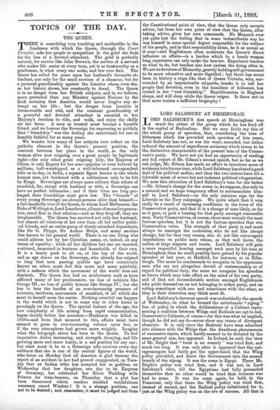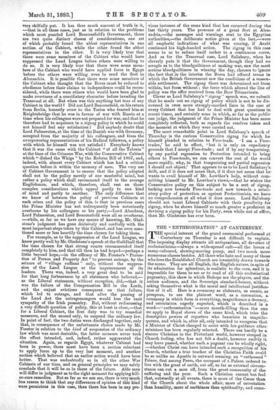LORD SALISBURY AT BIRMINGHAM.
T,ORD SALISBURY'S first speech at Birmingham was; much the ablest of the group which he has fired off in the capital of Radicalism. But we may fairly say this of the whole group of speeches, that, considering the tone of bitterness which has pervaded such speeches of late years,. Lord Salisbury has not, as was his wont, exceeded, but rather reduced the amount of superfluous acrimony which seems to be
distinctive characteristic of the present tone of the Conser- vative party. We have not yet had an opportunity of reading any full report of Mr. Gibson's second speech, but so far as we can judge, Mr. Gibson has made an effort to introduce more of acrimony into his one tone, while Lord Salisbury has abated a good deal of his political malice, and thus the two orators have hit a.. tolerable mean of severe but not indecent political vituperation. Wenote this alteration of Lord Salisbury's tone for the better —Mr. Gibson's change for the worse is, we suppose, due only to a natural and we hope temporary effort to accommodate him- self to Lord Salisbury—as the only ominous sign for the Liberals in the Tory campaign. We quite admit that it may really be a result of increasing confidence in the force of the Conservative party, and that it is a change of tone likely, so far as it goes, to gain a hearing for that party amongst reasonable- men. Party Conservatives, of course, cheer most warmly the most furious speeches, but it is not the furious speeches that win. Conservative votes. The strength of that party is and must always be amongst the moderates, who do not like abrupt change, but for that very reason, also do not like extravagant imputations on public men whom, as they well know, the- nation at large respects and trusts. Lord Salisbury will gaiw a more respectful hearing amongst such men by his tone at Birmingham than he could possibly have gained by his popular speeches of last year, at Hatfield, for instance, or in Edin- burgh. The more he condescends to recognise in his opponents. men who are not altogether devoid of statesmanship or of regard for political duty, the more we recognise his speeches. as forces which may take effect on the mind of his own party,. and of that not inconsiderable section amongst Englishmen, who pride themselves on not belonging to either party, and on, voting sometimes with one and sometimes with the other, as- they in their discretion may think most fit.
Lord Salisbury's cleverest speech was undoubtedly the speech of Wednesday, on what he termed the unfortunate "zigzag line of policy in which the deliberations of a Cabinet repre- senting a coalition between Whigs and Radicals are apt to end.. Conservative Cabinets, of course—for this was what he implied,. though he did not say it—never show any traces of divergent elements. It is only since the Radicals have been admitted into alliance with the Whigs that the disastrous phenomenon of successive slants, which hardly seemed to be dictated by the- same general aim, has appeared. In Ireland, he said, the view of Mr. Bright that "force is no remedy" was tried first, and much too long. It was only after it appeared that the out- ragemongers had fairly got the upper-hand, that the Whig policy prevailed, and drove the Government into the second branch of the zigzag. It was the same in Egypt. There Mr- Bright's policy was tried first, and it was not, in Lord Salisbury's view, till the Egyptians had fully persuaded themselves that no other would be tried that recourse was had to arms. It was the same again, he held, in the Transvaal, only that there the Whig policy was tried first,. instead of second, and the Radical policy substituted for it,. just as the Whig policy was on the eve of success. All that is vvry skilfully put. It has thus much amount of truth in it, —that in all these cases, just as in relation to the problems which most puzzled Lord Beaconsfield's Government, there are two quite distinct classes of considerations, one set of which probably found the ablest representatives in one section of the Cabinet., while the other found the ablest representatives in the other. It is very likely true that there were some members of the Cabinet who would have suppressed the Land League before others were willing to do so. It is very likely true that there were some mem- bers of the Cabinet who would have applied force in Egypt before the others were willing even to send the fleet to Alexandria. It is possible that there were some members of the Cabinet who thought that the Boers must be reduced to obedience before their claims to independence could be recon- sidered, while there were others who would have been glad to make overtures of a conciliatory character before invading the Transvaal at all. But when was this anything but true of any Cabinet in the world V Did not Lord Beaconsfield, on his return from Berlin, honestly avow to the Tories who feasted him at Knightsbridge that he was in favour of war with Russia at a time when his colleagues were not prepared for war, and that he therefore had to acquiesce in a zigzag policy in which he could not himself feel any satisfaction ? Did anybody doubt that Lord Palmerston, at the time of the Danish war with Germany, accepted from the majority of his colleagues, and from the overpowering representations of his Radical followers, a policy with which he himself was not satisfied Everybody knows that it was the same with the Cabinet "of all the Talents" at the time of the Crimean War, with the Conservative Cabinet which "dished the Whigs " by the Reform Bill of 1867, and, • indeed, with almost every Cabinet which has had a critical • question before it within the memory of men. The very use of Cabinet Government is to ensure that the policy adopted shall not be the policy merely of one masterful mind, but rather a policy which shall recommend itself to the average Englishman, and which, therefore, shall rest on those complex considerations which appeal partly to one kind of mind and partly to another. The only difference that we know of between the policy of previous Cabinets at such crises and the policy of this, is that in previous cases the Prime Minister has not unfrequently been notoriously overborne by his colleagues or his party,—Lord Aberdeen, Lord Palmerston, and Lord Beaconsfield were all so overborne, —while, so far as we have any means of knowing, Mr. Glad- stone's judgment has gone decisively and cordially with the most important steps taken by this Cabinet, and has even sanc- tioned more or less heartily the time chosen for taking them.
For example, as to the suppression of the Land League, we know pretty well by Mr. Gladstone's speech at the Guildhall that the time chosen for that strong course recommended itself completely to him, and that till then he had hoped—perhaps a little beyond hope,—in the efficacy of Mr. Forster's "Protec- tion of Person and Property Act" to prevent outrage, by the seizure of "village ruffians" only, without the suppres- sion of the Land League or the imprisonment of its leaders. There was, indeed, a very great deal to be said for that long forbearance by all statesmen who believed,— as the Liberal statesmen, without exception, did,—that it was the failure of the Compensation Bill in the Lords, and the unjust evictions consequent. on that failure, which led to outrage, and that after the passing of the Land Act the outragemongers would lose the tacit sympathy of the Irish peasantry. But, without rediscussing a very difficult question of policy, this at least is clear,—that for a Liberal Cabinet, the first duty was to try remedial measures, and the second only, to suspend the ordinary law. In point of fact, the two duties were discharged together, only that, in consequence of the unfortunate choice made by Mr. Forster in relation to the kind of suspension of the ordinary
. law which was most desirable, the latter measure never took the effect intended, and, indeed, rather aggravated the situation. Again, as regards Egypt, whatever Cabinet had been in power, there must have been a section reluctant to apply force up to the very last moment, and another section which believed that an earlier action would have been better. That was undoubtedly so in all the other War Cabinets of our time, and on general principles we may safely conclude that it will be so in those of the future. Able men will differ in judgment as to the right moment for applying kill- or-cure remedies. But so far as we can see, there is very much less reason to think that any differences of opinion of this kind were pernicious in this case, than there has been in any pre- vious instance of the same kind that has occurred during the last thirty years. The presence of a great fleet at Alex.. andria,—the messages and warnings sent to the Egyptian authorities,—the deliberate notice given at the last,—were all emphatic indications of what was coming, if Arabi continued his high-handed action. The zigzag in this case seems to us to reduce itself rather to a continuous curve. And as for the Transvaal case, Lord Salisbury, when he cleverly puts it that the Government, though they had no scruple as to the bloodguiltiness of making war, saw the most serious bloodguiltiness in winning the day, chooses to ignore the fact that in the interim the Boers had offered terms in which the British Government saw the conditions of a reason- able settlement. The zigzag there was determined not from within, but from without ; the force which altered the line of policy was the offer received from the Boer Triumvirate. Clever as Lord Salisbury's " zigzag " speech was, we submit that he made out no zigzag of policy which is not to be dis- covered in even more strongly-marked lines in the case of every Cabinet that has had to deal with great questions in recent times, and certainly none in which, so far as the public. can judge, the judgment of the Prime Minister has been more completely reflected, both as regards the resolves taken and the moment at which they were carried out.
The most remarkable point in Lord Salisbury's speech of Thursday is the curious Conservative zigzag for which he himself pleaded in relation to Free-trade. .1 am a Free- trader,' he said in effect, 'but it is only on expediency grounds that I accept Free-trade ; and if by any temporising, by any partial regression to Protection intended to bring others to Free-trade, we can convert the rest of the world more rapidly, why, to that temporising and partial regression I should not object.' That appears to us to be Lord Salisbury's
drift, and if it does not mean that, if it does not mean that he wants to avail himself of Mr. Lowther's help, without com- mitting himself to Mr. Lowther's views,—that he wishes the Conservative policy on this subject to be a sort of zigzag, tacking now towards Free-trade and now towards a retali- atory policy of protection as against Protectionists, we have- no comprehension at all what it does mean. Lord Salisbury. should not taunt Liberal Cabinets with their proclivity for zigzag, when he shows himself so much greater a proficient in devising a zigzag policy for his Party, even while out of office, than Mr. Gladstone has ever been.



































 Previous page
Previous page